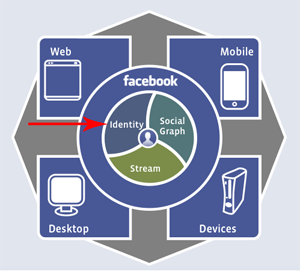 I suppose on the surface, it seems OK – Facebook is creating an environment where you get a real sense of the web. With the new Facebook changes, it is now becoming required to add apps to your timeline before you can access certain content. So when a friend links to a New York Time article, don’t be surprised when it doesn’t take you off-site and instead asks you to install the New York Times app. What this means is that not only will you be broadcasting on your wall that you read that article – but EVERthing you read on the New York Times site will then become a part of your timeline.
I suppose on the surface, it seems OK – Facebook is creating an environment where you get a real sense of the web. With the new Facebook changes, it is now becoming required to add apps to your timeline before you can access certain content. So when a friend links to a New York Time article, don’t be surprised when it doesn’t take you off-site and instead asks you to install the New York Times app. What this means is that not only will you be broadcasting on your wall that you read that article – but EVERthing you read on the New York Times site will then become a part of your timeline.
There’s a couple of things that leap out about this:
- It means timelines could become very boring, as much of the content is not curated, it’s automatic.
- Do you really want your entire internet life to be public?
One of the values of self-publishing is doing away with curators, because curation limits the amount of work that’s made available. So the Facebook changes could seem more democratic – more of an accurate depiction of the brain of cyberspace. But with self-publishing, the book is at least curated by the writer. A writer has final judgment on what he or she publishes. Facebook is now “self-publishing” all activity, even if a person might not want to see it broadcast. I suppose if you’re reading something on the New York Times site, you shouldn’t be guarded about that – why not tell people. But on the web, there is a big difference between something you browse and something you think is important enough to share.
Until now, I haven’t actually been all that concerned with Facebook’s privacy issues. People lament – they’ll use your personal information to sell you products. This doesn’t really bother me – I can just ignore it like I avoid most advertising on the web. If the Adsense links in my gmail account link to self-publishing sites because I’ve looked at self-publishing-related content, I don’t feel violated. Sure, your actions are being tracked, but these actions are still relatively private: the advertisements are only visible to me. But with Facebook actually broadcasting my internet activity to other people, it’s making my private information public. This is different.
To play devil’s advocate: maybe this is progress. The fact that so much browsing is not public means that we’re only getting a slice of people’s internet activity. Getting a complete picture of web browsing isn’t just interesting to marketers, it’s interesting in general – much like the recent study measuring mood on Twitter.
If you take something like the Occupy Wall Street movement, only some people are linking to articles to the protests compared to those who are actually reading the content. The latter may give a more accurate sense of people’s interest in political movements, entertainment, books, whatever it may be. The trouble is that there are many people reading an article about the protest who don’t necessarily agree with the protest’s goals – which is why curation is ultimately important.
Open Graph is Working
All this said, the Open Graph doesn’t seem to be dramatically altering Facebook’s feed. One of the knocks against self-publishing is that you have to sift through mountains of crap to find the gems, and now Facebook is basically enacting this policy for the feed. However, the Facebook feed hasn’t been overwhelmed by nonsense – broadcasting all Spotify activity hasn’t been a resounding success, for example, and most people seem to be disabling it.
These things seem to fix themselves, which was also the argument for self-publishing – the absolute crap would be virtually invisible because no one would link to it. There is curation in something being read vs. totally ignored. So long as disabling apps is an option, this doesn’t seem like a terrible development. Facebook is potentially crossing the line by tracking your surfing habits even when you’re not logged in – which cannot be disabled unless you remove every FB cookie, so Facebook isn’t privacy-issue free. But the curation issue is another example of how internet media is always evolving and saying, blanketly, “this is bad,” the way people once did about self-publishing, is usually inaccurate.
Still, this is something to keep your eye on – both as a Facebook user, but also if you’re marketing a book. Kobo, for example, has an app that makes your book reading public, an expanded opportunity for writers. If you don’t want this to happen, you’ll have to disable these apps. Maybe you don’t want everyone knowing you read Harlequin romances – or maybe you do. Like self-publishing, it’s up to the user to decide whether or not it’s a useful tool.
Get an Editorial Review | Get Amazon Sales & Reviews | Get Edited | Get Beta Readers | Enter the SPR Book Awards | Other Marketing Services






















Leave A Comment